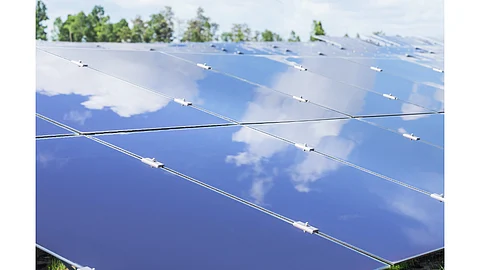

Kiwa PVEL and Kiwa PI Berlin have collaborated on a white paper with updated PV module quality requirements
It targets to enhance the reliability and performance of solar sites worldwide by assigning benchmarks to evaluate module quality
In this white paper, Kiwa assigns benchmarks to evaluate the quality of solar modules under various tests
Solar PV testing, inspection and certification (TIC) group Kiwa has come out with a comprehensive set of new quality requirements in a white paper by Kiwa PV Evolution Labs (PVEL) and Kiwa PI Berlin. This updated guidance, in response to demand from module manufacturers and buyers, is aimed at enhancing the reliability and performance of solar sites globally, it explained.
Titled Raising the Bar: Defining acceptable levels of quality for PV modules, the white paper stresses on rigorous and continuous quality assurance of modules to guarantee their performance and safety, especially as these are deployed in various environments, including extreme weather conditions.
Another reason for the revised testing guidance is the consistent and fast evolution of PV technology with newer versions and newer cell technologies gaining traction.
“These advanced technologies, while offering significant efficiency gains, also present increased risks due to their heightened sensitivity to material choices and manufacturing processes. The complexity of these technologies means that even small deviations in material quality or production consistency can lead to performance degradation or premature failure,” reads the white paper.
It assigns benchmarks to evaluate the quality of solar modules through extended reliability Product Qualification Program (PQP) testing, Pre-Shipment Inspection (PSI), Batch Testing and Ongoing Reliability Monitoring (ORM).
Through its Product Qualification Program (PQP), Kiwa does not give a defined pass or fail result for PV modules since these are tested in lab conditions, while onsite results may differ. For instance, some module buyers see 5% power degradation as the pass or fail threshold for PQP results.
Stressing a ‘clear need’ for more official PQP acceptance guidance, Kiwa said it is publicly providing this based on the range of test results seen in PQP testing over the last few years, including those reported in the 2024 PV Module Reliability Scorecard (see Kiwa Launches 10th PV Module Reliability Scorecard).
Based on the test result trends and test types like thermal cycling (TC), damp heat (DH), mechanical stress sequence (MSS), and potential induced degradation (PID), it recommends 3% degradation as a pass and 5% or greater degradation as a fail.
For Pre-Shipment Inspection (PSI), Kiwa shared the test results conducted on 774 batches of solar modules between 2022 and 2023. It found that only 76 batches were defect-free and passed the inspection without any issues. These lead to safety concerns for the end users.
The highest proportion of these defects was related to Electroluminescence (EL), followed by frame defects, among others. Kiwa now recommends classifying PV module defects into the 3 categories of minor, major, and critical to ensure precise and effective quality control.
The white paper also includes recommendations for batch testing and Ongoing Reliability Monitoring, including test protocols, test frequency and result expectations.
“We have used the past years of PQP data to create clear direction for the industry on what test results should be considered acceptable,” said VP of Sales and Marketing at Kiwa PVEL, Tristan Erion-Lorico. “This is the first time Kiwa PVEL has publicly provided this guidance, which will surely lead to more reliable PV module designs and material selection.”
The white paper can be downloaded for free on Kiwa’s website.
Speaking of reliability, the upcoming TaiyangNews Reliable PV Module 2024 Conference will look into the reliability aspect of modules as manufacturers navigate designing long-lasting high-quality solar panels in a period of extreme cost pressure. The 2-day event on October 21 and 22, 2024 is open to all with free registrations that can be done here.
